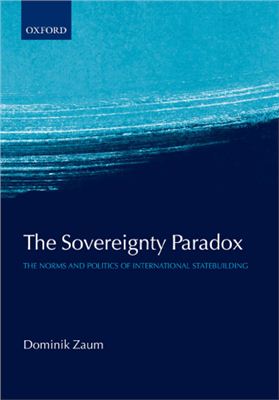Oxford University Press, 2007. 282 p.
The post-cold war years have witnessed an unprecedented involvement by the United Nations in the domestic affairs of states, to end conflicts and rebuild political and administrative institutions. Inteational administrations established by the UN or Weste states have exercised extensive executive, legislative, and judicial authority over post-conflict territories to facilitate institution building and provide for interim goveance.
This book is a study of the normative framework underlying the inteational community's statebuilding efforts. Through detailed case studies of policymaking by the inteational administrations in Bosnia and Herzegovina, Kosovo, and East Timor, based on extensive interviews and work in the administrations, the book examines the nature of this normative framework, and highlights how norms shape the institutional choices of statebuilders, the relationship between inteational and local actors, and the exit strategies of inteational administrations. The book argues that a particular conception of sovereignty as responsibility has influenced the efforts of inteational administrations, and shows that their statebuilding activities are informed by the idea that post-conflict territories need to meet certain normative tests before they are considered legitimate inteationally. The restructuring of political and administrative practices to help post-conflict territories to meet these tests creates a sovereignty paradox: inteational administrations compromise one element of sovereignty--the right to self-govement--in order to implement domestic reforms to legitimize the authority of local political institutions, and thus strengthen their sovereignty.
In the light of the goveance and development record of the three inteational administrations, the book assesses the promises and the pathologies of statebuilding, and develops recommendations to improve their performance.
Why Study Statebuilding and Inteational Administrations?
Methodological Challenges
Outline of the Argument
Concepts and theories
Sovereignty in Inteational Society
The Problematic Concept of Sovereignty
Towards a New ‘Standard of Civilization’?
Inteational Administrations in Inteational Society
A History of Inteational Administrations
Sources of Authority of Inteational Administrations
Inteational Administrations in Inteational Society
Case studies
Statebuilding in Bosnia and Hercegovina
Background
Policymaking in Bosnia and Hercegovina I: The Reform of the Payment System and the Dismantling of the Payment Bureaux
Policymaking in Bosnia and Hercegovina II: The Reform of the State-level Civil Service
Sovereignty and Statebuilding in BiH
Statebuilding in Kosovo
Background
Policymaking in Kosovo I: Human Rights and the Reform of the Judicial System
Policymaking in Kosovo II: Property Rights and Privatization
Sovereignty and Statebuilding in Kosovo
Statebuilding in East Timor
Background
Policymaking in East Timor I: Human Rights and the Reform of the Judicial System
Policymaking in East Timor II: Rebuilding the Civil Service
Sovereignty and Statebuilding in East Timor
The Sovereignty Paradox
Sovereignty in Inteational Society
Inteational Society and Inteational Administrations
The post-cold war years have witnessed an unprecedented involvement by the United Nations in the domestic affairs of states, to end conflicts and rebuild political and administrative institutions. Inteational administrations established by the UN or Weste states have exercised extensive executive, legislative, and judicial authority over post-conflict territories to facilitate institution building and provide for interim goveance.
This book is a study of the normative framework underlying the inteational community's statebuilding efforts. Through detailed case studies of policymaking by the inteational administrations in Bosnia and Herzegovina, Kosovo, and East Timor, based on extensive interviews and work in the administrations, the book examines the nature of this normative framework, and highlights how norms shape the institutional choices of statebuilders, the relationship between inteational and local actors, and the exit strategies of inteational administrations. The book argues that a particular conception of sovereignty as responsibility has influenced the efforts of inteational administrations, and shows that their statebuilding activities are informed by the idea that post-conflict territories need to meet certain normative tests before they are considered legitimate inteationally. The restructuring of political and administrative practices to help post-conflict territories to meet these tests creates a sovereignty paradox: inteational administrations compromise one element of sovereignty--the right to self-govement--in order to implement domestic reforms to legitimize the authority of local political institutions, and thus strengthen their sovereignty.
In the light of the goveance and development record of the three inteational administrations, the book assesses the promises and the pathologies of statebuilding, and develops recommendations to improve their performance.
Why Study Statebuilding and Inteational Administrations?
Methodological Challenges
Outline of the Argument
Concepts and theories
Sovereignty in Inteational Society
The Problematic Concept of Sovereignty
Towards a New ‘Standard of Civilization’?
Inteational Administrations in Inteational Society
A History of Inteational Administrations
Sources of Authority of Inteational Administrations
Inteational Administrations in Inteational Society
Case studies
Statebuilding in Bosnia and Hercegovina
Background
Policymaking in Bosnia and Hercegovina I: The Reform of the Payment System and the Dismantling of the Payment Bureaux
Policymaking in Bosnia and Hercegovina II: The Reform of the State-level Civil Service
Sovereignty and Statebuilding in BiH
Statebuilding in Kosovo
Background
Policymaking in Kosovo I: Human Rights and the Reform of the Judicial System
Policymaking in Kosovo II: Property Rights and Privatization
Sovereignty and Statebuilding in Kosovo
Statebuilding in East Timor
Background
Policymaking in East Timor I: Human Rights and the Reform of the Judicial System
Policymaking in East Timor II: Rebuilding the Civil Service
Sovereignty and Statebuilding in East Timor
The Sovereignty Paradox
Sovereignty in Inteational Society
Inteational Society and Inteational Administrations

